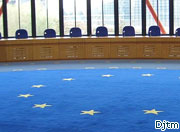Secularism is optional, but religious liberty is non-negotiable, a judge at the European Court of Human Rights (ECHR) has said in the Italian crucifix case.
A fellow judge said secularism isn’t neutral, and requiring a state to pursue a secularist agenda risks intolerance.
The stark warnings came last week as the Grand Chamber of the ECHR ruled that the display of crucifixes in Italian state schools was not a breach of human rights, reversing a previous decision from 2009.
Freedom
In his decision Judge Giovanni Bonello said: “A court of human rights cannot allow itself to suffer from historical Alzheimer’s.
“It has no right to disregard the cultural continuum of a nation’s flow through time, nor to ignore what, over the centuries, has served to mould and define the profile of a people.”
He added: “Freedom of religion is not secularism. Freedom of religion is not the separation of Church and State.
Optional
“Freedom of religion is not religious equidistance – all seductive notions, but of which no one has so far appointed this Court to be the custodian.
“In Europe, secularism is optional, freedom of religion is not.”
In her judgment Judge Ann Power warned that the pursuit of secularism could actually lead to intolerance of others beliefs.
Secularism
She said: “Neutrality requires a pluralist approach on the part of the State, not a secularist one. It encourages respect for all world views rather than a preference for one.”
She warned that the court’s previous ruling in 2009, which has now been overturned, “was striking in its failure to recognise that secularism (which was the applicant’s preferred belief or world view) was, in itself, one ideology among others.
“A preference for secularism over alternative world views—whether religious, philosophical or otherwise—is not a neutral option.”
Intolerance
She added: “To prohibit in public schools, regardless of the wishes of the body politic, the display of a symbol representative of that (or indeed any other religious) tradition and to require of the State that it pursues not a pluralist but a secularist agenda, risks venturing towards the territory of intolerance – a concept that is contrary to the values of the Convention.”
These comments are likely to be welcomed by many Christians who have become increasingly concerned at attempts to drive religion from the public sphere.
Neil Addison, a barrister and religious liberty commentator, said: “Decisions by the European Court of Human Rights have to be applied by UK Courts when interpreting the Human Rights Act and it is to be hoped that this case will mark a change in the attitudes of UK Courts which in recent cases have all too often assumed that Secularism is the only legally acceptable Human Rights point of view.”
Crucifixes
Last week’s ruling reverses a previous decision by the court in 2009 which said the display of crucifixes could be disturbing to non-Christian or atheist pupils.
The case centred on a complaint made by a Finnish woman, Soile Lautsi, who is married to an Italian.
She objected that her two children had to attend a public school in northern Italy which had crucifixes in every classroom.
Culture wars
Last year a top media commentator warned that the rising tide of secularism was not a state of neutrality but an attempt to get rid of religion and enforce its own values and beliefs.
“The public sphere is conceived as being neutral and neutrality is interpreted as being without religion”, Melanie Phillips told the Church of England Newspaper.
“I believe that in fact there is no neutrality in the culture wars.” She said that secularism is often presented as neutral, “but to be secular is to embrace certain values and beliefs. Instead of neutrality there is an attempt to get rid of religion and to promote something else instead.”
Brutality
The commentator added: “It has produced a ‘me society’, a society of great selfishness and increasing cruelty and brutality. We no longer see the need to put other people first. Instead we adopt an instrumental approach towards them.”
She also pointed out that Britain’s Judeo-Christian heritage gave rise to values of “freedom, equality and putting other people first”.
She warned: “There definitely is a tide of secularism which is carrying all before it. It sees religion as hostile to those values I have just mentioned when in fact it is religion that underpins them.”

